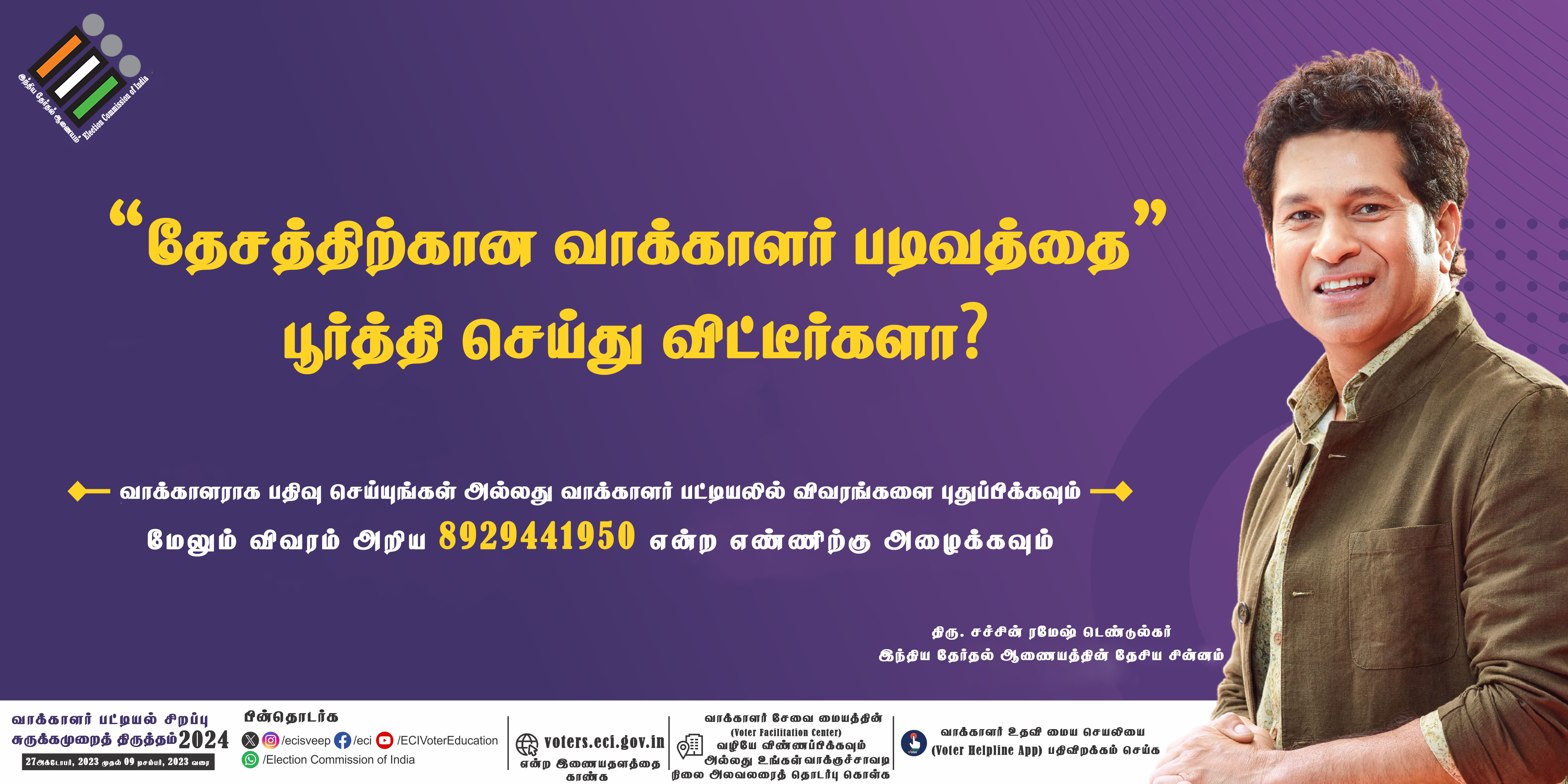THE OFFICE OF THE DIRECTOR GENERAL
The office of the Director General co-ordinates with all the wings of the Highways Department for better and efficient functioning of the department.
The office of the Director General carries out the following functions :
- Establishment, Personnel and General Administration matters in Highways Department.
- Overall Planning and Budgeting of Highways Department.
- Monitoring of Quality Control.
- Managing the e-pathai related IT solutions by Information Technology Cell.
- Implementation and monitoring of Institutional Capacity Enhancement (ICE) and Road Safety (RS) components approved under TNRSP-II by Institutional Capacity Enhancement and Road Safety Cell (ICERS Cell).
- Training.
- Expediting Land Acquisition.
- Co-ordination of Court Cases.
ADMINISTRATION :
The office of the Director General is fully responsible for the establishment and personnel administration matters of all the staff of Highways Department.
The total staff strength of this department is 6863. Of this, 1843 are Engineers, 843 are Technical Staff and 4177 are Administrative and Ministerial staff.
PLANNING :
The overall Planning, Budgeting of various projects implemented by Highways Department are done in planning. The various proposals for improving the quality of roads and road network are being sent to the Government for approval and implementation.
QUALITY CONTROL:
The overall monitoring of quality of works executed by Highways Department throughout the state.
e-PATHAI RELATED IT SOLUTIONS BY INFORMATION TECHNOLOGY CELL :
For effectively managing the maintenance of road network and related infrastructure in Tamil Nadu, e-Pathai (Electronic Project, Administration, Traffic, Highway Assets & Information Management System) system comprising of following softwares is being maintained by Information Technology Cell.
- ROAD MAINTENANCE MANAGEMENT SYSTEM (RMMS)
- GEOGRAPHIC INFORMATION SYSTEM (GIS)
- INTEGRATED PROJECT, HUMAN RESOURCE AND FINANCE MANAGEMENT SYSTEM ( P& FMS)
In the e-PATHAI application, RMMS (Road Maintenance Management System) has been developed to effectively prioritize the road works using a computerized system. The RMMS database consists of road condition data of State Highways & Major District Roads and now the system has been customized to upload the data of Other District Road (ODR) and Sugar cane road (SCR).
Another application in e-PATHAI namely, Geographical Information System (GIS) is currently used for viewing spatial attributes of existing roads which are being maintained through RMMS. It is proposed to upgrade the existing GIS application with mobile applications and other current advance technologies.
The Integrated Project, Human Resource & Finance Management System (P&FMS) is an e-PATHAI application, which aims at state-wide computerization to automate the existing manual procedures and process followed for Project Management, Financial Management and Employee Record System for improved information, communication, project monitoring and office management.
IMPLEMENTATION AND MONITORING OF INSTITUTIONAL CAPACITY ENHANCEMENT AND (ICE) AND ROAD SAFETY (RS) COMPONENTS APPROVED UNDER TNRSP-II BY INSTITUTIONAL CAPACITY ENHANCEMENT AND ROAD SAFETY CELL (ICERS CELL)
INSTITUTIONAL CAPACITY ENHANCEMENT AND ROAD SAFETY (ICERS)
I. Institutional Capacity Enhancement (ICE)
Institutional Capacity Enhancement works are taken up at a cost of Rs.66.00Crore under World Bank Funded TNRSP II. The components are:
- 1.M&E information System (Road UserSatisfaction Survey, Feedback system etc.,)
- 2.Process improvements and Organizational Restructuring.
- 3.IT-ICT based systems (upgradation of e-pathai).
- 4.Human Resources Development (Training Need Assessment).
The various works have been taken up in the above component & stages are given below:
- •Revamping of Tamil Nadu Highways Act, 2001 and Rules 2003, is in progress through the Consultant.
- •Updation of Highway Manuals are in progress through the Consultant.
- •Procurement of laptops and desktops& UPS for Highways Department through Electronics Corporation of Tamil Nadu (ELCOT) is in progress.
- •Development of “Computerized Management Information System (CMIS)” for land acquisition process in Highways Department through National Informatics Centre (NIC) is in progress.
- •Development of “Works Management System (WMS)” for automation of key activities of the Highways Department through National Informatics Centre is in progress.
- •Collection of Road condition data using Advance Data Collection Equipment(ADCE) for SH & MDR is in progress.
- •Training Need Assessment study was taken up and completed. Training policy, Training calendar, Training Manual, Standard operating Procedure (SoP), Business Development Plan for Training Centre were submitted by the consultant.
- •Development of e-library has been completed and to be hosted in TNSDC.
II.Road Safety (RS)
Road Safety component works are taken-up at a cost of Rs.120.00Crore under World Bank Funded TNRSP II. The components are:
- 1.State level- Strategic Advisory Assistance
- 2.State level- Operational Assistance.
- 3.District level Initiative- Kancheepuram.
- 4.Second District level Initiative-Tiruvannamalai.
- 5.Corridor level Interventions.
- •It is a multisectoral approach to improve the Road Safety facilities & Management Capacity of various stakeholders such as Highways, Health, Police and School Education.
- •Road Safety Management Consultant has been engaged to carry out strategic and operational level initiatives to enhance Tamil Nadu Road Safety Management Capacity.
- •Road Safety Activities in Stakeholder departments viz., Highways, Health, Police, & Education Department are being funded under the Road Safety component of TNRSP II. The major activities are given below: -
- •Highways- Road Safety Improvement Works in Safe Demonstration Corridor for a length of 95.6Km (Kanchipuram & Tiruvannamalai Districts) including Intelligent Transport System (ITS) have been taken up.
- •Health- Training to Health Professionals, Procurement of medical equipment for Centre of Excellence in Tiruvannamalai HQ Hospital & Kancheepuram HQ Hospital, Procurement of Medical equipment and Ambulances to Hospitals/PHC for strengthening of Trauma care & emergency services along the Safe Demonstration Corridor
- •Police- Procurement of enforcement related equipment to Police department in Safe Demonstration Corridor.
- •School Education- Creation of Road Safety awareness program to school children in Kanchipuram District.
Institutional Capacity Enhancement & Road Safety Cell carryout the procurement, inter & intra department coordination for the effective implementation of ICE & RS components approved under TNRSP-II.
To meet the targets set for the enhancement of Institutional capacity, 17 sub tasks identified. Some of the key tasks are:
- Conditional Road User Satisfaction Survey (RUSS) for obtaining the feedback from Road users/ stakeholders to assess the performance of the projects.
- Process Re-Engineering to accommodate e-governance procedures, standardize the existing manuals, codes & documents so as to facilitate better functioning.
- Amendment of TN Highways Act 2001, to meet it a standalone act to simplify the land acquisition procedures, safe guard the road assets.
- Review and up gradation of existing e-pathai systems such as RMMS, P&FMS, GIS, etc. to suit the present needs including procurement of required hardware and software. This would also facilitate in automation of certain manual procedures.
- Conducting training need analysis and prepare training calendar including suggestion for resource mobilization for the continuance of training program.
- Strengthening of Institution, establishment of e-library, smart class rooms, etc., are also envisaged.
ROAD SAFETY PROTOCOL :
Further, for identification and removal of black spots through engineering measures, a protocol has been formulated and this will be facilitated by the engineering committees. The field level committee comprising of the Divisional Engineer (C&M) and Divisional Engineer (Investigation) carry out joint inspection and suggest suitable Engineering measures. At circle level, the Superintending Engineer (C&M) concerned will review, prioritize and shortlist the proposal received from field committee considering the factors such as accident fatalities, grievous injuries and the possible threats due to Engineering defects. The recommendations of the SE (C&M) concerned will be appraised, shortlisted further by the state level committee comprising of Director General, Highways, Chief Engineer (C&M) and Director, HRS. Shortlisted proposal will be recommended for sanctioning to government under appropriate scheme.
TRAINING :
Training is essential to improve knowledge, skills and attitudes of the personnel in the department. The Engineers and staffs of the department are being deputed to undergo training at various reputed training centres, on continual rotational basis.
- Engineers are deputed for refresher courses and updated courses conducted by the reputed training organisations like Indian Academy of Highways Engineers (IAHE), Indian Road Congress (IRC), Asian Institute of Transport Development (AITD) organised by Ministry of Road Transport and Highways (MORT&H), International Association for Bridge and Structural Engineering (IABSE), Highways Research Station (HRS), IRF etc.
- The Civil Service Training Centre, is giving the training to all the ministerial staff at Bhavanisagar, Erode, Tamilnadu regarding the training on office administration on regular basis.
- The Skill Development Courses, Self-Motivational Programme and Management Courses are conducted by the Anna Institute of Management (AIM) to the Engineers and Ministerial staff of this department.
EXPEDITING LAND ACQUISITION :
The office of the Director General co-ordinates with field land acquisition units for expediting land acquisition by centralised Land Acquisition Unit.
CO-ORDINATION OF COURT CASES :
The office of the Director General co-ordinates with the Government Pleaders in Court of Law, on important cases related to technical and personnel issues on day-to-day basis by Exclusive Legal Unit.
|









